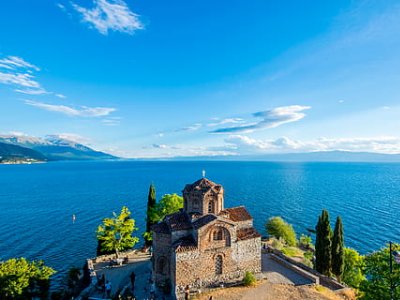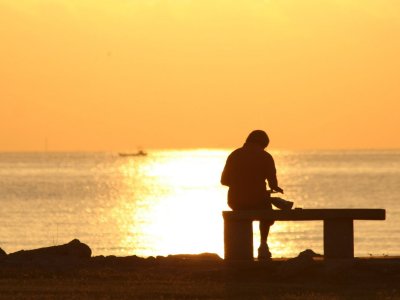
THE MAN FROM MACEDONIA
society and the economy. And yet the evidence shows that even they can only predict what’s likely to happen in the next four hundred days. That’s basically thirteen months. Beyond that, they can’t predict.
Churches should set a vision for what they want to do, rooted in prayer, the Holy Spirit and the needs of their local community, but their ability to predict what will be needed in even three years’ time is uncertain. Good planning needs to be flexible and to adapt to changing circumstances. And that makes sense from what we know of God. After all, the people of Israel spent forty years getting from Egypt to Canaan when it could have taken them weeks to get there in a straight line. Instead they zigzagged their way, forming a nation and a religion in the process.
And the early Church, having been given a commission by Jesus to make disciples of all nations, took their time on the starting blocks. They enjoyed the experience of being filled with the Holy Spirit but it was only when persecution got underway that they found the impetus to take the Gospel much beyond Jerusalem. They made smart plans, for sure. St Paul made a point of taking the Gospel to the cities, knowing he would reach large crowds and could rely on those crowds to take the news out to the surrounding villages. But a lot of what the early Church did was in response to visions received in the moment: Paul seeing a vision of Jesus on the road to Damascus; Peter seeing a vision of how the Gentiles would be enfolded in this new Jewish faith. And in Acts today, St Paul responding to the vision of a Macedonian man imploring him to go there by making the crossing from what is modern day Turkey to modern day Greece.
It was an intuitive, Spirit led approach. Acts 16 says Paul and his friends were ‘forbidden by the Holy Spirit to speak the word in Asia’ (Asia in this case meaning western Turkey). We have no idea why; no reason is given. And then it says they tried to go to Bithynia ‘but the Spirit of Jesus did not allow them’. Again, we can’t be sure what that means, other than their sense that God was closing doors and not opening them. You get the feeling Paul is sure his mission is in the area and yet he is frustrated at every turn. These obstacles came on top of a recent falling out between Barnabas and Paul that would have hurt him deeply and played on his mind. And then the man from Macedonia pops up in Paul’s dreams. As so often in life, God’s guidance comes when it is needed, not when it is wanted - and it comes unexpectedly.
Some people assume it was easier to share the Gospel in the ancient world of Paul’s than it is today, because the culture was so much more religious. In reality, that made it harder as there was such a large marketplace for faith. There was also huge bias against the story of a crucified man from a minority ethnic background. If God was with him, why did he suffer like that? And if he rose from the dead, how come he wasn’t showing himself? It’s said one of the blocks to faith today is that too many people have had just a little exposure to the Christian faith and this small experience acts like an inoculation against the real thing, like injecting a small dose of live germs into an arm so the body learns how to protect itself against the disease. Many think they know what the Christian faith is all about, but they don’t when it comes to it. If this has been true, then things might be changing. Many people know so little about the faith today that they are probably ready to be infected with its love and joy.
The second thing that made it harder to share the faith was the hostile opposition the early Church experienced. Paul kick started this himself in the months before met with Jesus on the Damascus road. But he spent much more of his life on the receiving end of violence and abuse. The plea from the man in Macedonia was seven words long: come over to Macedonia and help us. What it didn’t say was that Paul and Silas would be beaten up, severely flogged and bound hand and foot in prison as a result of answering that call.
We simply have no experience of that level of hostility to Christians in the United Kingdom. And there is no point beating ourselves up over that. It is wonderful to worship in peace. But a church being true to its origins should always set aside time to talk about and pray for Christians and churches in other countries that get the kind of treatment Paul and Silas did. Persecution has pretty much been the norm for the Church throughout history; as St Paul said: ‘remember my chains’. It is too easy to look the other way or to forget altogether.
The third thing that made it harder for the early Church is that they had to be Church without any buildings. It was St Paul’s strategy always on his travels to visit first the local synagogue to preach Jesus. If the synagogue responded well, he would stay there. More often he was kicked out and had to use private homes and public places to preach the Gospel. It got the message out there more inclusively than staying in the Jewish place of worship, but it also exposed him and others to risk. Public places were not as safe as synagogues, as Paul quickly discovered in Macedonia when he delivered a girl from spirit possession and got on the wrong side of her owners.
Acts 16: 6-10 shows there is a time and a place to do evangelism. Paul did not plunge in at every opportunity; he had a genuine sense that God should direct when and how it happens. Paul listened carefully to God and, as his experience in Athens in Acts 17 shows, he first listened carefully to his listeners before preaching about the risen Jesus. In listening, he figured out where and how God was already at work in the culture, and he ran with that.
If Paul’s travels could be summarised in a news bar, they would likely say:
Do not lose heart; the kingdom of God is drawing near; God will do this work both with us and without us.
Any church strategy that takes account of these truths will never lack a compass – or an engine room.
POPULAR ARTICLES

God In The Cow Shed
2020 has been dominated by the C word. Not that C word. I mean conspiracy theory involve space. Some people believe the

Viral With The Holy Spirit
Since the tech revolution, insurgent new start-ups have enjoyed using the word ‘disruption’

Long Lost family
Some types of storytelling mess with your brain. Intentionally. Like one of those novels where you assume

Valuing Age
Lots of work is being done round unconscious bias in society, especially around gender and ethnicity

